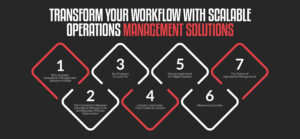
Is your business running at its full potential, or are outdated processes slowing you down? The world we live in does not spare agility and efficiency, and it is only necessary to make the right choice of Operations Management Solutions. Startups and large businesses can use scalable solutions to simplify their operations, save costs, and gain a better competitive advantage.
This blog will explain how Operations Management Solutions are transforming work processes and why your digital strategy must revolve around scalability.
Why Scalable Operations Management Solutions Matter
The ability to adapt to the world of 2025 is essential for business success. The market’s needs change quickly, and the manual process can no longer work. Operations Management Solutions are used here. Such platforms are created to centralize control, track performance in real time, and deliver actionable insights.
Scalability implies that your solution will be able to scale with your company. Your systems must be modified either by expanding into new markets, adding products, or expanding employment without interfering with daily operations. A scalable solution allows you to pay for what you want and expand its features to meet your needs.
The Connection Between Operations Management and Business Process Optimization
One of the greatest advantages of enacting such solutions is Business Process Optimization. Companies can automate repetitive tasks, minimize human error, and increase data visibility.
- Improve productivity
- Cut down the cost of operation
- Reach data-driven, faster decisions
- Improve satisfaction among employees
Optimization does not imply doing things quicker, but doing smarter. Analytics, reporting, and workflow management all-in-one tool will enable you to realize where the bottlenecks are and how to improve, so that your business is always one step ahead.
Key Features to Look For
Not all Operations Management Solutions are created equal. When evaluating options, keep an eye out for these critical features:
- Automation Capabilities: Automate redundant activities such as invoicing, schedule, and stock management.
- Real-Time Data Analytics: Get real-time understanding of performance values.
- Cloud-Based Access: Allowing neutral working and real-time decision making.
- Scalable Architecture: Scale out new functionality, integrations, and even users.
- Protection and Compliance: Have protection and compliance guarantees on your data, thus staying up-to-date with your industry regulation.

Industry Use Cases: From Chaos to Control
Let’s explore how different industries can benefit from these solutions:
Retail: Chaos may occur due to seasonal demand and the changing inventory. Retailers will be able to make predictions, track inventories in real-time, and also optimize their labour with the integrated operation tools.
Manufacturing: Delays in production, shutdown of equipment, and quality control are continuous issues. Predictive maintenance capabilities together with completed operations can bring about a high amount of waste and uptime ratings.
Healthcare: Patient management, billing, and scheduling can be multifaceted with multiple systems. Healthcare regulations can be followed at the same time as reducing the stream of operation, through centralized platforms.
Finance and Insurance: Data processing and risk management must be highly accurate. Operations tools can automate document management, customer relations, and compliance reporting.
How to Implement the Right Solution
Selecting the appropriate Operations Management Solutions cannot be compared to a mere feature comparison. Here is a road-map:
- Assess Your Needs: Find out which are most inefficient.
- Define Objectives: Do you intend to cut down on expenses, or a goal speedier turnover, or to be a satisfactory customer?
- Consult Stakeholders: Seek the opinions of stakeholders in other departments to have cross-functional parallel.
- Evaluate Vendors: Seek providers that have worked in your industry and have scalable services.
- Plan the Rollout: Commence with a pilot program, then extend it throughout the company.
Measuring Success
Nothing can go right in the blink of an eye, and when you have the proper KPIs, you will be able to follow up on the progress. The following metrics are to be monitored:
- Less processing time. Reduction in processing time
- More production at the same resources
- Long-term cost advantages
- Customer satisfaction and employee satisfaction scores
Such upgrades, in the long term, will increase the level of profitability, the rate of growth, and enhance competitive standing.
The Future of Operations Management
Due to AI developments and machine learning, the future of Operations Management Solutions is extremely bright. Predictive analytics is on the way to demonstrating the threats prior to their development into an issue, and intelligent integration will further enhance the effectiveness of tools.
As these new technologies develop, business organizations that work with scalable operations management today will be more secure in the future in the face of new challenges.
Final Thoughts
A successful organization is based on efficient operations. Operational Management Solutions will help your company to tap the full potential of every resource, streamline the processes, and prosper in the quickly growing competitive world.
Scalable solutions provide the scope of expanding, adapting, and innovating without having to reinvest frequently. A combination of the power of Business Process Optimization comes along with a recipe of sustainable success.
Don’t let outdated systems hold you back. Transform your workflow today with the right operations strategy and lead your industry forward.
Related Blogs
 Cybersecurity on a Budget: Strategies for an Economic Downturn - When budgets tighten, cybercriminals don’t slow down; they get smarter. Economic recessions provide the ideal storm for businesses: limited resources, heightened pressure, and more attacks on organizations that skimp on security. This is why it is even more important to consider investing in managed cybersecurity services when the budget is limited, not less. During unstable […]
Cybersecurity on a Budget: Strategies for an Economic Downturn - When budgets tighten, cybercriminals don’t slow down; they get smarter. Economic recessions provide the ideal storm for businesses: limited resources, heightened pressure, and more attacks on organizations that skimp on security. This is why it is even more important to consider investing in managed cybersecurity services when the budget is limited, not less. During unstable […] Why Proactive Cybersecurity Management Beats Post-Attack Recovery Every Time - Imagine waking up to headlines about your company’s data being leaked. The systems are down, clients are panicking, and recovery teams are scrambling. Hours feel like days, and every moment costs more than the last. This isn’t a distant nightmare anymore. It’s a daily reality for businesses that choose to react instead of prevent. In […]
Why Proactive Cybersecurity Management Beats Post-Attack Recovery Every Time - Imagine waking up to headlines about your company’s data being leaked. The systems are down, clients are panicking, and recovery teams are scrambling. Hours feel like days, and every moment costs more than the last. This isn’t a distant nightmare anymore. It’s a daily reality for businesses that choose to react instead of prevent. In […] Why Managed Cybersecurity Services Are No Longer Optional - Every 39 seconds, a cyberattack occurs somewhere in the world. In fact, global cybercrime damages are projected to reach $10.5 trillion annually by 2025 (Cybersecurity Ventures). This rising menace is no longer a remote possibility to businesses of all sizes: it is a day-to-day reality. The increased remote working, cloud usage, and digital-first approaches have […]
Why Managed Cybersecurity Services Are No Longer Optional - Every 39 seconds, a cyberattack occurs somewhere in the world. In fact, global cybercrime damages are projected to reach $10.5 trillion annually by 2025 (Cybersecurity Ventures). This rising menace is no longer a remote possibility to businesses of all sizes: it is a day-to-day reality. The increased remote working, cloud usage, and digital-first approaches have […]
Schedule a Consultation
Contact McLane Intelligent Solutions and Experience Texas IT Services Without The Geek Speak
